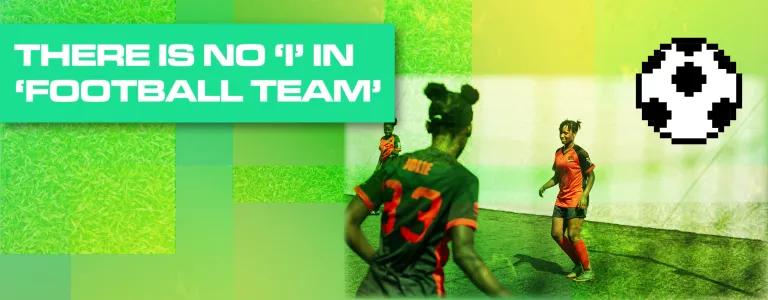
There Is No ‘i’ In ‘football Team’
Include this article in your Skills Builder Journal. It could help you develop... ![]()
![]()
Football culture is experienced from a very individual perspective, but the community is a close-knit collective that teaches you teamwork and communication. Here’s what I learnt (and what I continue to learn) by being part of a team.
Being part of a women’s football team is a real eye opener. You quickly learn how connections and friendships are made and who you can trust. If you hit the jackpot, the whole team gets along, and you can trust everyone, which is great because the team then works better together and the success rate is automatically increased. Not only does your team dynamic shape you as a person, but it teaches you things you didn’t know about yourself. It teaches you that you can run a lot faster than others on the pitch (or even just outpace them). It shows you that you are stronger than you think, both physically and mentally, and if you’re not, it teaches you how to get there. It makes you realise that you are surrounded by people who’ve got your back, and that they will help you if you help them. Peers are everything in team sports, and you can tell within the game when something has happened off the pitch.

Football shows you how close you must be to your peers in certain situations. You need technique and skill. You need pace and stamina, but if you can’t rely on your striker to have the confidence to shoot, or your keeper to dive, or your partner in midfield to pass you the ball, the game is mentally over before the first whistle is even blown. In my experience, this really is a game changer. If you know someone well enough that they won’t pass the ball, if you know you’ll be dispossessed if you pass to them, even though it’s a bad idea, you pass elsewhere. Personally, I believe the best teams are those where the players are the closest, because not only do they act like a family dynamic (which in terms of football, does actually work), but they know all there is to know about each other and that can be applied to any situation, like football, especially when it comes to tactics.
If you are in a team, you understand the logistics behind it. In football, you pass the ball about, you cross it to the players upfront, and they try and smash it in the back of the net. However, it’s a bit more complicated than that. You also understand the differences between each player. You understand how to change your game plan to fit each person and how to manoeuvre them to link best with the players around them. Yes, I am aware this could come across like I am explaining a game of FIFA to you, but in reality, football is not the same. There are all the aspects of each person that you have to get to know, to understand how they fit into the team and the game. Every person is different, so even if two players may appear to be the same on paper in terms of their football skills, . Tthey react differently to injuries and situations that occur on the pitch. They make different split decisions that impact the outcome of the game. Even the way they act in a game can be different between people. Then there’s the actual control that you have to have between you, your team, and the ball. Of course, there’s also the blame game. The blame for mistakes. The blame for conceding. The blame for losing the match. Usually, it’s the goalkeeper who ends up with the majority of the blame (or the referee), but at the end of the day, you can blame each other until your lips turn blue, but you just have to trust each other. This is what I’ve realised over the years: that you can be the best player ever or even just in your team, but if you can’t trust or be trusted by those around you, you won’t be the best player at all, because there is no “I” in “team” and players only look good because of those surrounding them, making them look good. I myself have seen many a player’s downfall because they can’t get their head round this concept: trust and companionship are everything.

To summarise, being in a football team creates friendships and connections that are crucial to the game and often your life. You learn how to trust and who to trust. You learn how every aspect of teamwork needs a link to the next. Being in a team makes or breaks you. Either way, you end up better off by being in the team or by having been in the team in the long run. You will realise this, even if it doesn’t feel like it right now.




